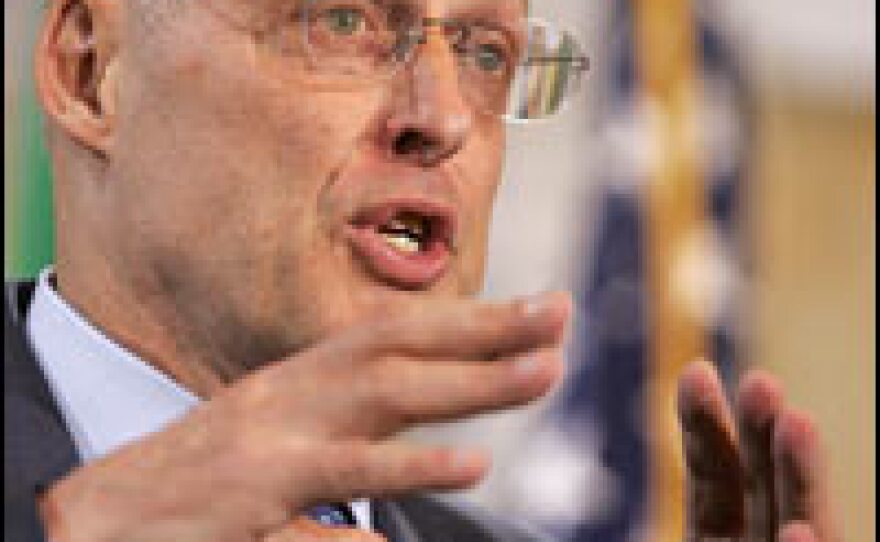
This week the Bush administration proposed what amounts to a massive overhaul of the way the government regulates financial markets. A big part of the administration's plan involves the Federal Reserve. The Fed already plays a central role in keeping the U.S. economy growing and stable.
But Treasury Secretary Henry Paulson has proposed turning the Fed into a kind of financial-market super cop. It could also look into the books at hedge funds, investment banks and even some companies.
This has been a time of turmoil in the U.S. economy, and the Fed has been pressed into action in some new and dramatic ways. Last month, for instance, the central bank engineered a takeover of the troubled investment bank Bear Stearns. And the Fed has agreed to lend money to other troubled firms as well.
On Monday, Paulson proposed some even more significant changes.
'Broad Powers' for the Fed
"The Federal Reserve would be provided with a different yet critically important regulatory role with broad powers focusing on the overall financial system," he said.
Paulson wants to turn the Fed into a kind of market stabilizer that could inspect the books at financial services firms for signs they're engaging in risky investments.
"The Fed would have the authority to go wherever in the system it thinks it needs to go to for a deeper look to preserve stability," Paulson said.
If Fed officials found potential problems, they could require the firms to take what Paulson calls corrective action, though he doesn't define what that would be. And Fed officials could publish some of the data they collect about trouble spots in the industry.
Paulson's proposal is aimed at curbing the kinds of risky investments that led to the current credit crisis, like the widespread use of complex mortgage-backed securities.
'Near the Edge of Meltdown'
"We've been in a financial crisis now since last August and have been very near the edge of total financial meltdown," says Lyle Gramley, a former Fed governor. "And there's widespread recognition now that we do need some more prudential regulation."
The proposals would appear to give the Fed some jurisdiction over a range of financial institutions it doesn't now regulate, including hedge funds, investment banks and private equity firms.
The Fed could go even further, Vince Reinhart of the American Enterprise Institute says.
"In principle, this would ... have given the Federal Reserve leverage to go into Enron and ask, 'Show us your trading book,'" Reinhart says. "In principle, it could go into a large complex institution that we normally think is nonfinancial but has a lot of financial activities like GE."
Markets Too Complex for the Fed?
Reinhart, who once worked as a Fed economist, says there is something else to consider.
"Remember, we have seen in the last eight months repeated instances of CEOs of large, complex financial institutions being fired because they didn't understand their balance-sheet risk at their institution," Reinhart says.
How likely is it, he asks, that Fed staff members making far less money will be able to understand them any better? In other words, Paulson may want the Fed to anticipate potential meltdowns, but in an ever-more-complex securities market that's not always so easy to do. And critics note that the Fed has had a spotty record detecting excessive risk-taking in the housing and stock markets.
A Preventive Role
Paulson concedes that the Fed's impact will be limited.
"No regulator can prevent all instability and market turmoil and this one won't either," Paulson said. "I would expect that we will continue to go through periods of market stress every five to 10 years."
But he says the government can give the Fed new tools to detect problems like the Bear Stearns collapse before they erupt. Administration officials also acknowledge this is just a starting point and that Paulson's plans are unlikely to get through Congress in their current form.
But they say the government needs to find ways to contain market meltdowns, and with its central role in the economy no agency is as well suited to attempt that as the Fed.
Copyright 2022 NPR. To see more, visit https://www.npr.org. 9(MDAzMjM2NDYzMDEyMzc1Njk5NjAxNzY3OQ001))







